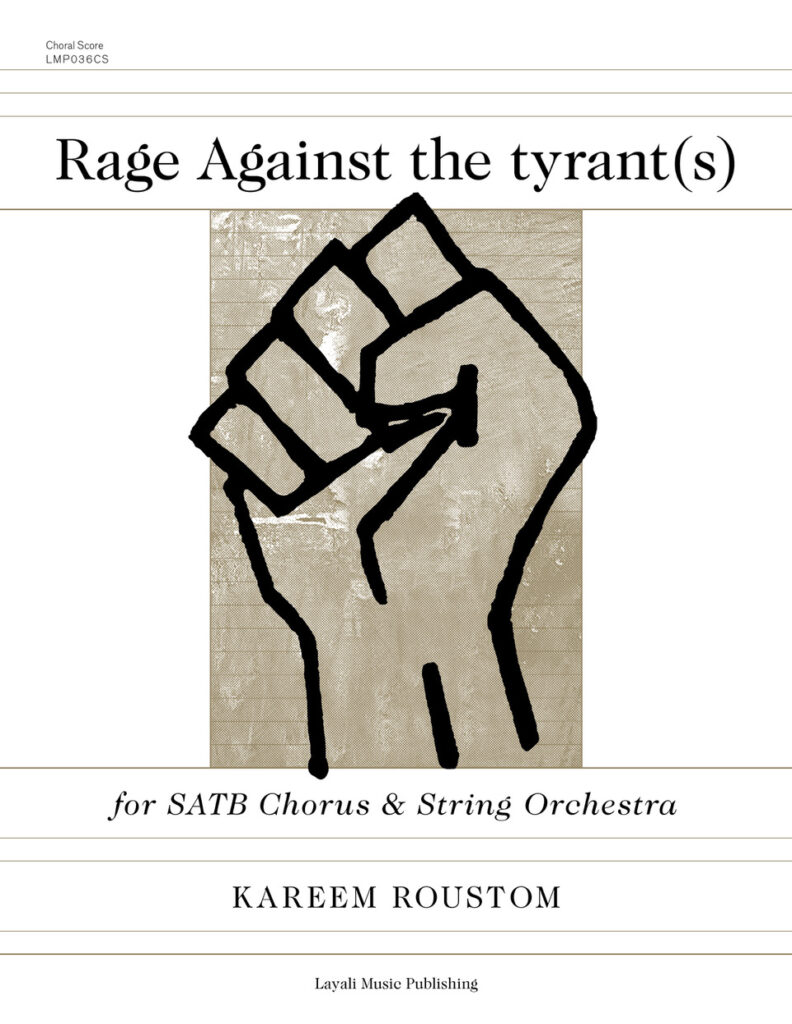Duration ca. 26′
Instrumentation: SATB Chorus & String Orchestra
For mixed chorus and string orchestra
Texts in this work are from street chants from the uprisings in Syria, Tunisia, Egypt & Palestine, as well as poems by Sinan Antoon, Mohja Kahf, Elias Roustom, and a Syriac Orthodox Christian hymn.
Commissioned by Coro Allegro and premiered in Boston, USA on March 11th, 2018.
Browse the Choral Score:
Brows the Full Score:

I. Street Chants
(Please be patient as this movement begins very softly)
II. When I was torn by war
III. Aleppo the necklace broke all the words fell apart
IV. Gnen Abde
V. We loved the land

Program Notes
There are two ways in which a composer comes to setting a text to music. The first is an instance when a text connects so viscerally with a composer that there is no choice but to set it. When, on the other hand, a commission is requested from a composer, for a concert with a broad theme, it is up to him or her to find the right text. This path is, by far, the more difficult of the two and such was my experience with this commission from Coro Allegro. I was very happy to be approached by David Hodgkins about writing a new work for Coro Allegro that dealt with some element of the crisis in Syria. At first, I hesitated, because since 2011, when the uprising in Syria began, almost all of my concert music output has focused on this theme. As Syria, and specifically Aleppo, had become synonymous with cruelty and the greatest failure of our generation, I felt that I had said all I needed to say on the topic, for now, and I needed a break. But things change, not least of all the 2016 election results here in the USA. So I felt that I did need to write this work but I wanted to create a work that was both specific, Syria, and broad, tyranny. So began the work of finding the right text with the end result being the street chants, poetry and liturgical text here.
The uprisings in the Arab world began with simple but fundamental demands, often expressed through protest chants. That people had to erupt on to the streets, and suffer for it, to demand ‘bread, freedom, and social justice’ still brings me great sadness. The euphoria felt by the protesters in some of these countries was viciously tempered by the realities of the cruelty that their governments were prepared to mete out upon them. Iraqi-American poet and author Sinan Antoon’s When I was torn by war reflects this harsh reality to great effect with his compact but powerful poem. Even though he wrote it in 1990 and was reflecting on the situation of Iraq at that time, Antoon’s poem’s image of endless war is enduring in its relevance and emotional impact. The destruction of Aleppo, and the lament over this tragic loss, is captured in Syrian-American poet and author Mohja Kahf’s Aleppo the Necklace Broke All the Words Fell Apart. Kahf’s ‘list poem’ is, like the city it describes, multi-layered with meaning and history; both distant past and recent. For instance the line blood river alludes to the executions of seventy-nine or so men and teenage boys in January of 2013. Their bodies were dumped in a river in Aleppo (I still remember the day I say the photos in the news). Kahf’s poem also addresses Aleppo’s multi-cultural and multi-faith past with references to both an Armenian folk song as well as Jewish liturgical songs. Gnen Abde is a traditional Syriac, a language similar to Aramaic, prayer used during Holy Week. The text tells of Christ, on the night of his passion, washing the feet of his disciples, some of whom were about to betray him. His example of forgiveness is on of the most enduring throughout the ages, but I chose this text because I am asking, “when do we forgive those who betrayed us?” The final text, We Loved the Land, comes from my brother, Elias Roustom. It speaks of a glorious past, perhaps real or imagined, and the willingness of a people to strike a bargain with tyrants in order to ‘go along to get along.’ This is what the text tells us happened in Syria but it is also a warning, for the complacent, about what could happen anywhere.
© 2018 Layali Music Publishing
